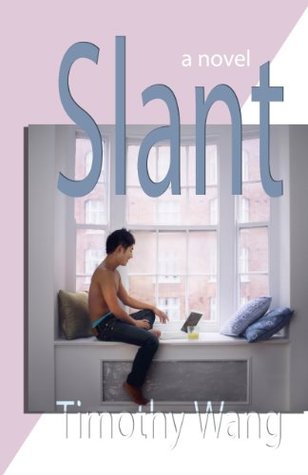
Timothy Wang’s debut novel Slant is about a gay Chinese boy growing up in America. As I was reading along, I found myself constantly laughing and relating to almost every page.
Wang tackles the issues that Asians and Asian Americans experience growing up. These issues are obvious and honest. We’ve all been there, the confusion of growing up different from what society mainly consist of, the self-loathe of our culture because we were watching shows that didn’t have culture, things that the majority population can’t seem to understand.
Culture and identity is huge nowadays. Up until now, people are just starting to realize that there is a lot more to what they surround themselves with.
The main character of Slant is James, a MIT student that struggles with being a gay male in the gay community, and also tries to find himself. Sounds like a typical coming out story that’s been overplayed one too many times right? Wrong. Here is a character who grew up in a traditional Asian home, with a mother (who could be a tiger mom) and a silent father who would sometimes answered in grunts and spoke no less than five words at a time.
In the beginning of the novel, as James is coming out, his mental state is like an infant’s: naive and curious. He meets and falls deeply in love with Stan, a coffee barista bad boy. Half way through the novel, the two split and James is thrown into a downward spiral. Heartbreak is one thing, but your first heartbreak is a different story. Not long after, James walks down a path of drugs, alcohol and promiscuity.
As the story progresses, James becomes hell bent on winning Stan back and changing his image. He even consults a plastic surgeon about raising his eyebrows and ridding himself of the extra skin on his eyelids to look more like an average white person. This displays and defines what self-loathe is. I began to see the battles that have been fought over and over with the general view of what people think of Asians. The first half of the book was about losing a war with the public; in this case, losing yourself into what you think is the norm.
Then James starts to date Michael, an aspiring doctor who has a nice family and grew up on riches to evoke jealousy from Stan. After some time passes, James meets Michael’s family. Immediately I thought this was not going to end well and sure enough it did not. Michael’s family treats James as if he just crawled out of a cave, bombarding him with questions about China and how it was.
When I read this, it makes me think of my time in central Illinois, where I was either Chinese or Japanese and nothing else. Was it the intention of Michael’s parents to appear annoying and ignorant? Or was it just out of plain discrimination?
I found myself digging deeper and flying through the book like a crazed drug fiend. The story of a less fortunate gay Asian man was unfolding and I was suddenly James.
I was the one who was facing discrimination at the dinner table. I was the one who people shook their heads with disapproval.
During the final chapters of this gay fiction novel, James accepts his past and reconnects with his estranged family. In the end all the characters split up and move on with their lives as if it was all just a dream. What I found was so compelling was that James failed, admitted he failed and then got right back up.
Also, this novel reads like a memoir and in some ways, I wished it was. Overall, I think this book was a great debut novel. Wang describes what it’s like to grow up Asian in a community that doesn’t think much or highly of culture. He did a fantastic job at it and I highly recommend this book.








